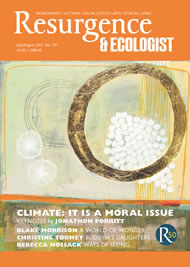The starting point of this book is an assumption that Western civilisation is going to hell in an handcart because – somewhere within the last 4,000 years or so – Homo sapiens began to lose touch with Nature, and severed contact altogether after the 17th-century Age of Enlightenment. The details of the modern malaise are barely discussed, but the symptoms are referenced: international poverty, climate change, biodiversity loss.
Few would argue that these are not very serious issues. For all the academic references, however – from Shakespeare to Schumacher via Descartes and Debussy – Giles Hutchins has essentially a romantic view of how life should be, based on the idea that Homo sapiens was much happier before modern ideas of science got in the way.
There’s no possibility, of course, of finding out whether this was true. The ancient Peruvian Caral civilisation is cited with some validity, but neither the Incas and their human sacrifice nor the brutality and almost persistent warfare amongst many African tribes are referenced. ‘Indigenous’ cultures and wisdom are simplistically assumed to have been superior to modern Western notions on the basis that they were closer to Nature than we are.
Hutchins has a point. It is unarguable that Western society (and, by the way, the rest of the rapidly developing world) has lost touch with the fact that Homo sapiens is part of Nature, not above and beyond it. This is something contemporary economists and politicians urgently need to understand: the economy is a part of the environment. But Hutchins teeters on the brink of saying that we were better off as Neanderthals. As far as the environment is concerned that may be true. However, this book won’t be read by Neanderthals, but by modern people looking for some rational way to adapt, change and improve the human condition.
In Hutchins’ analysis the rot set in with the ancient Greeks. Not all of them: Homer gets a clean bill of health because he reflects the vestiges of a pagan, Neolithic mysticism. It’s post Socrates that it all started to go wrong. The early Catholic Church is praised for retaining some semblance of remembering our place within a world order governed by Nature. The Reformation and the advent of human-centric attitudes ruined that; and Protestantism, with its insistence that God created humanity in his image with dominion over the rest of creation, paved the way to the real villains of this piece: the scientists and philosophers of the Enlightenment.
Bacon, Hobbes, Newton, Descartes – all are accused of ushering in a scientific revolution that assumed that we could do living by numbers and that everything could be explained rationally in an intrinsically irrational world. Their thinking led to the Industrial Revolution and the abandonment of an ancient and sacred relationship between people and Nature.
Hence, in Hutchins’ analysis, via other villains like Darwin, Freud (but not Jung) and the very contemporary Richard Dawkins, we have ended up with a colossal planetary mess. He likens the current Western mindset to cancer and rightly asserts that most attempts to solve our social, economic and environmental challenges are rooted in the same technical and science-based assumptions of anthropocentric superiority, which will only defer and deepen the crisis.
But let’s not forget, either, what Hobbes actually said about the state of Nature:
“In such condition, there is no place for industry; because the fruit thereof is uncertain: and consequently no culture of the earth, no navigation, nor use of the commodities that may be imported by sea […] no knowledge of the face of the Earth; no account of time; no arts; no letters; no society; and which is worst of all, continual fear, and danger of violent death; and the life of man solitary, poor, nasty, brutish, and short.”
Hobbes had a point, too.






